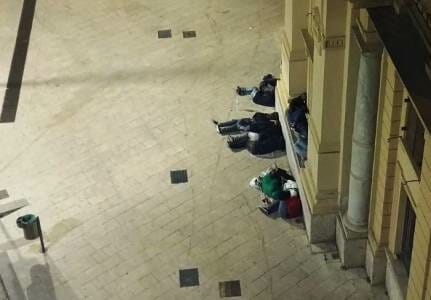Visiting the highly specialized center for unaccompanied minors in Ragusa
On April 13th,
2015, a highly specialized center for unaccompanied minor refugees opened in
Ragusa. It is maintained by the cooperative “Together for life”. We visited the
center located in the former Hotel Rafael, in the main street close to the
cathedral. The building consists of several floors and is also equipped with a
porch and a patio facing a small alley where many of the young people living
here assembled today, because of the sunny weather. I’m welcomed by the
employees and the manager, who immediately agrees to explain the situation of
the center to me.
The center is allowed
to take in 37 minors and, at the moment, is fully booked. The minors mainly
hail from francophone countries such as Mali, Senegal, Guinea, and the Ivory
Coast yet there are also young men from Nigeria, Gambia, and Egypt. The average
age is 17, but there are also younger people yet none younger than 14. All of
them arrived on or later than September, 12. “The law allows for a 90 day stay,
which has been respected up until now,” the manager explains. “This, however,
does not mean that they haven’t begun procedures or that they tried to
integrate and assimilate the teenagers.” Then, we speak about the specific
problems of the first reception of minor refugees, especially the question of
guardianship. “The court in Catania told me that the files concerning the
minors who arrived until September, 12, have almost been worked through. This
means that our minors are next, because they arrived on that day. Fortunately,
this procedure, which has been agreed to by the court in Catania, enables that
the minors can be temporarily put under the structure’s care. This means that
we were able to have those who wanted to apply for international protection
fill in the form C3 beforehand and, thus, we were able to send them to school.
In the case of the minors from Egypt, however, we have to wait for the court to
appoint a legal guardian.” Then, we talk about the difficulties of this
procedure, which brings on the risk of elongating the period of time until an
employee can become a guardian. This can possibly hurt the fair-mindedness of
the guardian which, however, is crucial for the protection of the minor. The
person in charge agrees that this procedure can only be used to the advantage
of the minors and only to provide the bare minimum until a fitting guardian is
appointed. This, he points out, is how it has been done until now. The minors
come to the center from different parts of Sicily, mainly from Augusta,
Catania, or the nearby harbor Pozzallo. Among those who have been brought to
other facilities, there are some who stayed in Ragusa and visit the center now
and then such as today. There are three employees, two guards, two lawyers, a
psychologist, a vocational adviser, and two interpreters who speak French and
Arabic working in the center. All employees, however, speak English and French
fluently. In emergencies they call other interpreters to communicate with the
minors. Once a week, a doctor visits the center to care for those minors who
already have documents. The employees of Save
The Children visit often to simply talk to the minors, but they also
offered a workshop for the employees that will take place in the next months.
The minors get a monthly allowance as well as phone cards. The meals, however,
are provided by an external catering service and the cooks increasingly try to
discuss the meal plan with the residents of the center. When we talked to the
minors no one complained about this.
We are sitting in the center’s main
office and our conversation is often interrupted by minors who either just want
to say hello or want to ask something. The relationship between staff and
minors seems to be relaxed and trusting. Afterwards, we walk around the center:
there are 23 bedrooms, all with a bathroom and two bunk beds, but there are
never more than three beds occupied. Besides the offices, there are common
rooms and a large living room with a patio, where dinner is severed and, for
example, some minors have Italian class. “One of the first things we try to
accomplish is to get the kids into school,” one staff member tells me. “The
youngest one goes to primary school and was welcomed so warmly that we all, him
included, were very surprised. He is invited for dinner at his friends’ houses
on Sundays and got to know a lot of families this way. That is why we try very
hard that he can stay in Ragusa after he has left the center and doesn’t have
to go somewhere else, where he has to start over again.”
All of the teenagers seem to enjoy school, although only 20 of the ones
older than 16 had the chance to take evening classes. Some of them also study
on their own on the patio where I meet some of them the next morning. The
common room is a place to listen to music and practice with the interpreters,
especially for those speaking Arabic, or, as in my case, to simply find someone
to have a conversation with. “It got a lot easier for me since having my cell
phone,” O. tells me, “also because I haven’t been here for long and don’t know
anyone in the city. That’s why I talk to my friends and family who are in the
Netherlands, England and all over Europe. They encouraged me when I decided to
leave my country. In my country, you don’t have the same sort of safety as in
Europe. When you are on the street all kinds of things can happen to you and no
one protects you.” A. who sits next to his friend agrees with this: “It’s true.
Here, we are fine. And I want to stay in Italy. In my country, in Guinea, I went to university, that’s why I can speak
seven languages, among them French and English. But I couldn’t stay there any
longer, so I went on a voyage that took me two years and eight months. I worked
very hard in Algeria and tried to reach Spain via Morocco but didn’t succeed
and therefore had to travel through Libya.” Like A. a lot of teenagers don’t
want to talk about their stay in Libya from which some of them carry visible
signs on their bodies. “For us it is still amazing to see how much these
teenagers change in ten days,” one employee tells me. “You can even see it
clearly on photos, that we later need for their documents. Only after a couple
of days their faces become the face of a teenager again. The suffering and
tiredness that hardened their faces during their voyage gives way to friendly
faces.” This is one of the reasons why it is important for the staff to help
the teenagers convey how hard their situation truly is and thus convince the
commission that protection and future safety is necessary, so that they can
give the minors the support a center like this should provide.
The liveliest are a couple of Egyptian minors who run from one room to the
other and listen to music on their cell phone. “A lot of them go outside and
meet with fellow countrymen to play soccer on a nearby playground. We now asked
for permission to use a second playground at the end of the street, but the
whole thing moves slowly and you got to be very patient,” the head of the
center adds. M. shows me some drawings on the wall: “In Gambia I drew a lot of
cloth and clothing. That’s what I want to do here as well. I met a lot of
Americans and Britons who came to my city to learn the techniques I use. That
is why I’m optimistic that I can succeed and that my drawings and clothing will
be valued in Italy as well. In my home country I am sadly no longer allowed to
work in my vocation.” We wish him many projects in the future and that he may
have a lot of patience. Surely not being alone anymore is in itself a form of
progress. M. continues: “I am sure that your chances get better the more
optimistic you are in the search for them.” We cannot help but agree with him.
Lucia Borghi
Borderline Sicilia Onlus
Translation: Annika Schadewaldt


